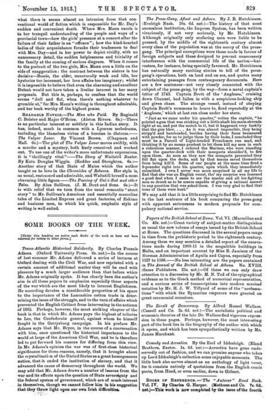SOME BOOKS OF TIIE WEEK.
[Budsr this heading we notice such Books of the week as have not been reserved for review in other forms.] Trans-Atlantic Historical Solidarity. By Charles Francis Adams. (Oxford University Press. 6s. net.)—In the course of last summer Mr. Adams delivered a series of lectures at 'Oxford dealing with the Civil War, and now reprinted with a certain amount of additional matter they will be read with pleasure by a much larger audience than that before which Mr. Adams originally spoke. It has clearly been the author's aim in all these papers to emphasize especially those aspects of the war which are the most likely to interest Englishmen. He according devotes a considerable proportion of his space to the importance of the Lancashire cotton trade in deter- mining the issue of the straggle, and to the turn of affairs which prevented the English Cabinet from intervening in the autumn of 1862. Perhaps, however, the most striking chapter of the book is that in which Mr. Adams pays the highest of tributes 'to Lee, the Confederate general, against whom he himself fought in the Gettysburg campaign. In his preface Mr. Adams says that Mr. Bryce, in the course of a conversation with him, once questioned the historical importance to the world at large of the American Civil War, and he is therefore led to put forward his reasons for differing from this view. In Mr. Adams's opinion the war was of first-class historical significance for three reasons, namely, that it brought about the crystallisation of the United States as a great homogeneous Nation, that it ended the institution of slavery, and that it advanced the cause of democracy throughout the world. We may add that Mr. Adams draws a number of hessons from the ,war and its effects upon the question of State sovereignty and the federal system of government, which are of much interest in themselves, though we cannot follow him in his suggestion that they throw light upon our own Irish difficulties.






























































 Previous page
Previous page